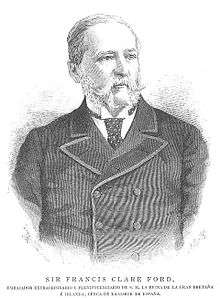Clare Ford
Sir Francis Clare Ford GCB GCMG PC (4 June 1828[1] – 31 January 1899) was an English diplomat from London.[2]

Ford was born at was born at 32 Upper Brook Street, the son of writer Richard Ford and his wife, Harriet.[3] He was commissioned a lieutenant in the 4th Light Dragoons. However, he left the army in 1851, entered the diplomatic service, and became Secretary of Legation at Washington, D.C., where he was acting chargé d'affaires in 1867–1868. In 1871 he was appointed Secretary of Embassy at St Petersburg and in 1872 was transferred to Vienna. He represented the British government in 1875–77 at Halifax before the Halifax Fisheries Commission, by decision of which $5,500,000 was awarded to Great Britain for superior advantages obtained by the United States in the Washington fisheries treaty of 1871. In 1878–1879 he was Minister to the Argentine Republic and during a portion of the time to Uruguay also.
Ford was afterward appointed to similar posts at Rio de Janeiro and at Athens. In 1884 he became Minister (from 1887 Ambassador) to Spain; while there he acted as British commissioner in Paris in 1884 and 1885 to settle the Newfoundland fisheries question. In 1892 he was transferred to Constantinople and in 1893 to Rome. His services to British diplomacy won for him frequent official recognition, including appointment to the Privy Council in 1888.[4]
References
- Ford, Brinsley; Ford, Richard (1974). Richard Ford in Spain: Catalogue of a Loan Exhibition in Aid of the National Art-Collections Fund 5th June-12th July, 1974 Held at Wildenstein, London. Wildenstein. p. 59. Retrieved 20 June 2019.
- Francis Clare Ford DNB
- Robertson, Ian (2005). Richard Ford 1796-1858: hispanophile, connoisseur and critic. Michael Russell. p. 59. Retrieved 20 June 2019.
- "No. 25846". The London Gazette. 14 August 1888. p. 4345.
- FORD, Rt Hon. Sir (Francis) Clare, Who Was Who, A & C Black, 1920–2008; online edn, Oxford University Press, Dec 2007, accessed 20 June 2012
- Sir Francis Clare Ford, G.C.B., G.C.M.G. (obituary), The Times, London, 1 February 1899, page 6
- This article incorporates text from a publication now in the public domain: Gilman, D. C.; Peck, H. T.; Colby, F. M., eds. (1905). New International Encyclopedia (1st ed.). New York: Dodd, Mead. Missing or empty
|title=(help)
| Diplomatic posts | ||
|---|---|---|
| Preceded by Lionel Sackville-West |
Minister Plenipotentiary to Argentina 1878–1879 |
Succeeded by Sir Horace Rumbold, 8th Baronet |
| Preceded by – |
Minister Plenipotentiary and Consul-General to Uruguay 1879 |
Succeeded by Hon. Edmund Monson |
| Preceded by G. B. Mathew |
Envoy Extraordinary and Minister Plenipotentiary to Brazil 1879–1881 |
Succeeded by Edwin Corbett |
| Preceded by Sir Robert Morier |
Envoys Extraordinary and Ministers Plenipotentiary to Spain (Ambassador to Spain from 1887) 1884–1892 |
Succeeded by Sir Henry Drummond Wolff |
| Preceded by Sir William Arthur White |
Ambassador to the Ottoman Empire 1891–1892 |
Succeeded by Sir Philip Currie |
| Preceded by The Lord Vivian |
Ambassador to Italy 1892–1898 |
Succeeded by Sir Philip Currie |